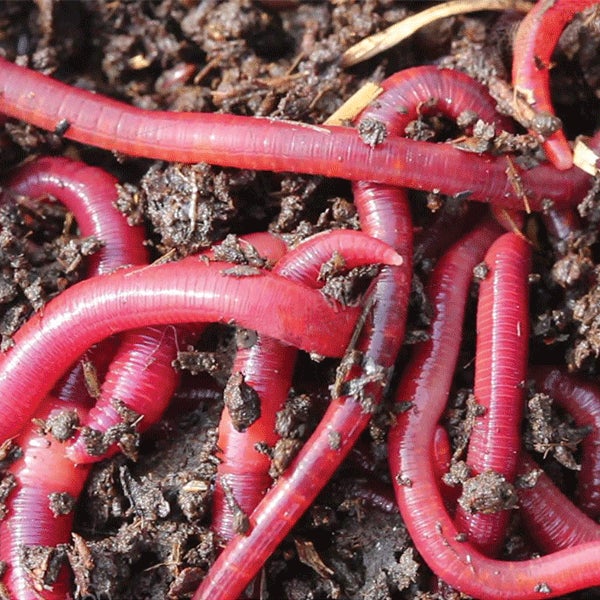Why Red Wigglers Are Vital for Natural Farming
Red wigglers play a pivotal duty in organic farming, mainly through their one-of-a-kind ability to decompose organic materials and boost dirt health and wellness. The extent of their influence on farming methods and dirt biology elevates appealing inquiries regarding the future of natural farming.
Duty of Red Wigglers in Dirt Health

In addition, red wigglers improve dirt framework by developing channels as they tunnel. These channels enhance aeration and water seepage, advertising a much healthier origin atmosphere. Their activity additionally assists in maintaining ideal moisture degrees, which is essential for healthy and balanced plant development.

Benefits of Worm Castings
Worm spreadings, the nutrient-rich excrement created by red wigglers, act as an effective change for natural farming. These castings are replete with essential nutrients such as nitrogen, phosphorus, and potassium, which are crucial for plant development. Unlike synthetic plant foods, worm spreadings release nutrients slowly, supplying a steady supply over time and minimizing the threat of nutrient leaching and runoff.
Moreover, worm castings boost soil structure and oygenation, promoting much healthier root systems. Their high natural matter web content enhances moisture retention, making it possible for plants to better stand up to drought problems. Furthermore, worm spreadings include advantageous bacteria that support plant health and wellness by subduing microorganisms and enhancing vitamins and mineral uptake.
The application of worm castings can lead to boosted plant yields and boosted quality of produce, making them an important resource for organic farmers. Their use likewise lines up with lasting farming practices, adding to dirt fertility without the adverse environmental impacts linked with chemical fertilizers. In general, the consolidation of worm castings right into farming go to my site practices fosters a more resistant and efficient community, emphasizing the significance of red wigglers in natural farming systems.

Enhancing Nutrient Cycling
(red wigglers)Nutrient biking is a vital procedure in chemical-free farming, and the combination of red wigglers plays a pivotal role in boosting this cycle. These earthworms contribute significantly to the failure of raw material, facilitating the transformation of intricate organic products into less complex, much more obtainable nutrients for plants. As red wigglers take in decaying natural matter, they eliminate nutrient-rich castings, which are including beneficial microorganisms. This microbial activity additional help in the disintegration process, making sure that essential nutrients are conveniently available for plant uptake.
Furthermore, red wigglers help to accelerate the mineralization of nutrients, transforming them from inert forms right into bioavailable types that plants can take in. This procedure is important for maintaining soil fertility and advertising healthy and balanced plant development. The visibility of red wigglers also motivates a varied dirt community, cultivating a balance of nutrients that supports different plant varieties.
Improving Dirt Framework
The improvement of dirt framework is vital for cultivating a healthy agricultural environment, and the task of red wigglers dramatically adds to this improvement. These earthworms play a vital role in freshening the dirt and producing a network of networks that facilitate water seepage and root penetration. As they burrow through the soil, red wigglers separate compressed layers, permitting for far better oxygen exchange and advertising microbial task.
Additionally, the organic matter created from their waste, called vermicast, boosts dirt aggregation. This procedure develops secure globs of dirt fragments, boosting dirt porosity and decreasing erosion (red wigglers). The visibility of red wigglers likewise motivates the development of advantageous fungal networks, which are crucial for nutrient uptake by plants
Promoting Lasting Practices
Incorporating red wigglers into natural farming methods not just improves soil health and wellness but additionally promotes sustainable farming methods. These earthworms play a vital duty in nutrient biking, transforming organic waste right into beneficial compost that improves the dirt. By making use of red wigglers, farmers can successfully decrease reliance on artificial plant foods, thus decreasing chemical drainage and its destructive effects on ecosystems.
Furthermore, the incorporation of red wigglers urges the technique of recycling natural products, such as kitchen area scraps and ranch waste. This waste decrease method not just decreases disposal expenses yet additionally fosters a closed-loop system where nutrients are continually returned to the dirt (red wigglers). Such methods are crucial in alleviating environment change, as they improve carbon sequestration and reduce greenhouse gas emissions
Additionally, red wigglers improve water retention in the soil, which is important in times of drought. Their burrowing tasks develop channels that enable water to penetrate deeper into the ground, hence promoting effective water usage. Inevitably, incorporating red wigglers right into natural farming not only sustains biodiversity but likewise straightens with the concepts of sustainable farming, using an all natural approach to food manufacturing.
Conclusion
In conclusion, red wigglers play an essential function in organic farming by substantially improving dirt wellness and fertility. Their ability to disintegrate organic matter and create nutrient-rich spreadings cultivates a thriving microbial community, which is necessary for nutrition cycling. In addition, the burrowing tasks of these worms enhance dirt framework and aeration, assisting in better water infiltration and root growth. Therefore, the assimilation of red wigglers right into farming techniques is essential for advertising sustainability and boosting total soil quality.